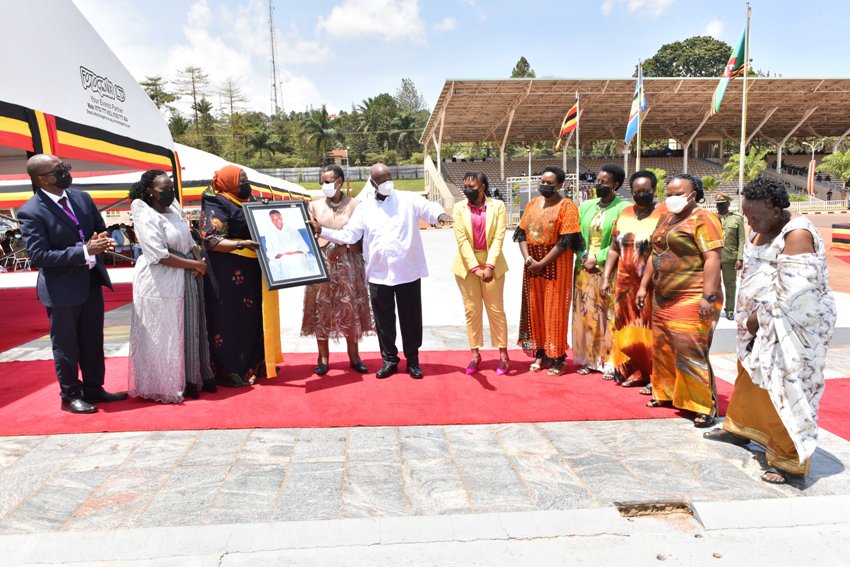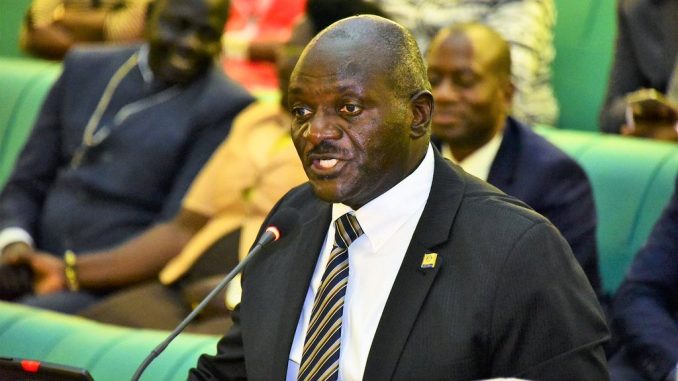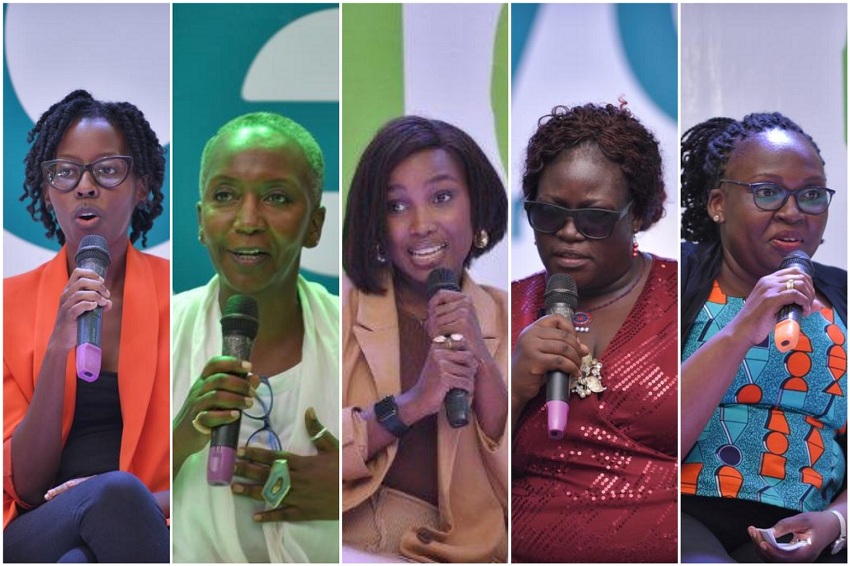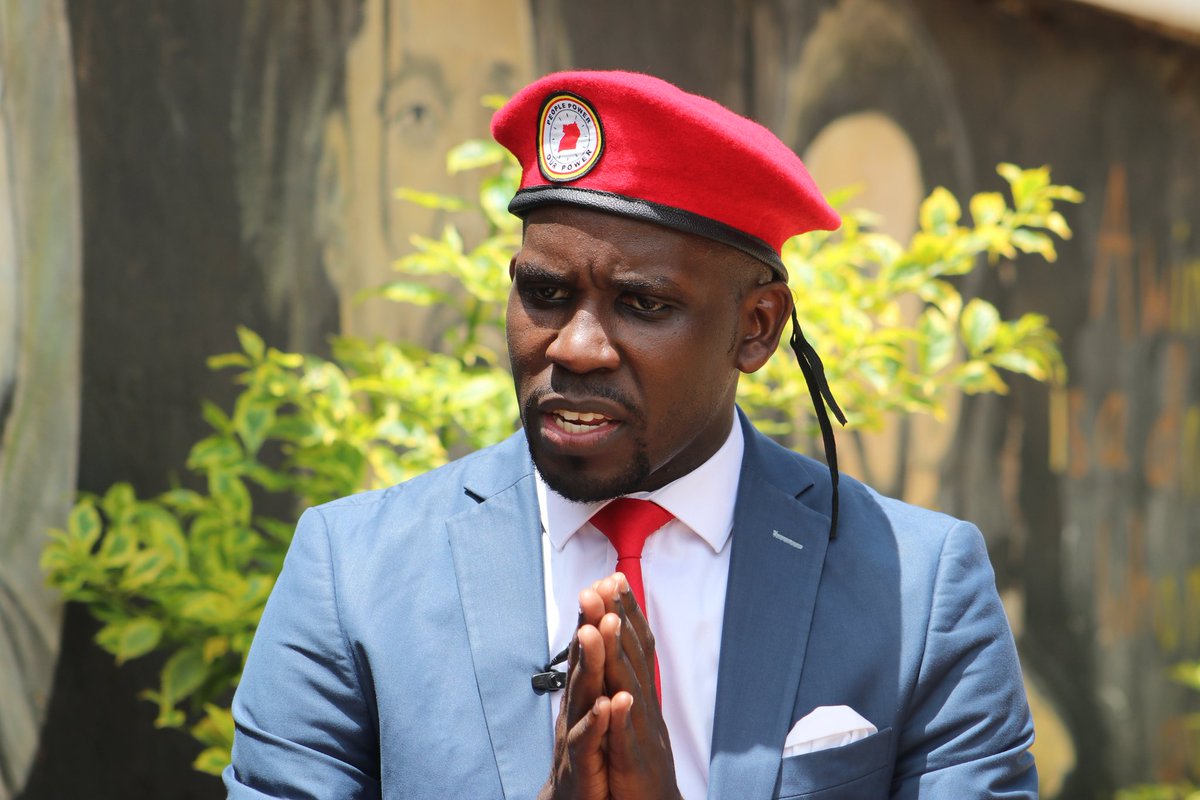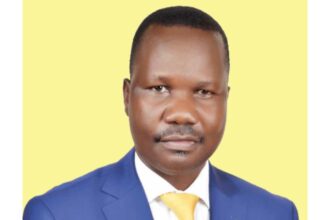Your Excellency the Vice President;
Your Lordship the Chief Justice;
The Right Honorable Prime Minister;
Rt. Honorable Deputy Prime Ministers;
Hon. Ministers;
Honorable Members of Parliament;
Your Excellencies the Ambassadors and High Commissioners;
Your Royal Highnesses the Cultural and Traditional Leaders;
Religious Leaders;
Development Partners;
Ladies and Gentlemen.
I salute all Ugandans on this occasion to commemorate the International Women’s Day. Since 1991 when this day was gazetted as a national day and a public holiday, the National Resistance Movement (NRM) Government has been able to demonstrate its commitment to achieve women’s social, economic and political emancipation. This has been achieved through a supportive legal and policy framework as well as Programmes that provide women and all community members with the required services for improved livelihoods and wellbeing.
On this day, we remember all women of Uganda for their contribution to national development in different ways. The majority of women till the land to sustain their families or work as labourers in commercial agriculture and in the informal sector. Women are providing care for the sick in health units and at home, they are selling produce in the markets, teaching the young ones, serving in the Armed Forces and many other professional fields. Today, we recognize all of them for their contribution towards our achievement as a Country.
I am, therefore, pleased that the theme selected for commemorating this year’s International Women’s Day: “Gender Equality Today for a Sustainable Tomorrow” stresses the fact that what we achieved in gender equality and women’s empowerment is the basis for securing sustainable development and hence a sustainable future. Sustainable development refers to the ability to meet the needs of the present generation without compromising the ability of the future generation to meet their own needs.
This, therefore, enables us to use the experience of the past and present to guide the goals for the future. At the center of sustainable development is the need to ably address climate change and environmental degradation, the effects of which have come in the form of draught, floods, and other natural disasters that affect the productivity and livelihoods of communities.
Our focus now is to take advantage of the gains in women’s empowerment to strengthen the efforts for tackling and mitigating the impact of climate change and environmental degradation.
The National Resistance Movement (NRM) Government placed the emancipation of women at the forefront of its agenda and the benefits of the supportive policies and laws are evident today. One of the key milestones of this Government was the promulgation of the 1995 Constitution which ushered in provisions for women’s increased participation in political leadership and recognition of their roles in social economic development.
Some of the recognizable indicators of the progress in the status of women are in the following areas:
Education and literacy: Presently, most of our children are in school. More girls than before are attending schooling. For example, girl’s enrollment in Primary school was at 24.6 % in 2001 and rose to the current 49.9%. Uganda has attained gender parity in Primary Education. Literacy rates of females have improved from 70% in 2012 to 71% in 2020. The Literacy rate for females now stands at 72% (UBOS 2019/20), an improvement from 68% in 2002. This is still lower than literacy rate for men at 81%.
Skilling Uganda in Business, Technical, Vocational Education and Training (BTVET): Reforms in this sub-sector have contributed to increased enrolment of females in this area, from 28.5% in 2007 to 34.6% in 2016 (MoES Factsheet). These efforts will lead to increased participation of women in the Manufacturing and ICT Sectors.
Health: Health services have improved and the maternal mortality rate has progressively declined to 336 deaths per 100,000 live births from 438 in 2011. 73% of births are delivered in a health facility, an increase from 57% in 2011. Nine in every ten persons (91%) can access health care within a 5 km radius. This is a good indication of progress in the provision of health services to the population.
Access to clean water and sanitation: Nationally, there is an increase in the households using improved water sources which stands at 80% and 83% of households using pit latrines. Overall, 79% of households have access to improved source of drinking water and 96% are within 30 km of the main drinking water source.
Increased power generation and expansion of electricity: Access to grid electricity among Uganda’s households has increased from 14% in 2012/13 to 24% in 2020. The national electricity access rate comprising both grid and off-grid connections, stands at 57% (UBOS 2020). The target is to ensure that 60% of the population have access to electricity by 2025.
Infrastructure: Government’s increased investment in infrastructure has facilitated production, trade including movement of goods, value addition and access to services. These investments include construction and maintenance of national, district and community roads. There has been an increase in ICT infrastructure development and uptake of services by the population. As of 2020, 74 percent of households owned a mobile phone and 84% are connected to internet services which is used for social networking.
Political Participation: In Cabinet, Women Ministers are currently 36 percent. In the Parliamentary Elections, 175 Women were elected as Members of Parliament. Of these, 146 are District/City Women Representatives, 13 are Representative of Special Interest Groups and 16 are directly elected. This gives us a percentage of 34% which is still above the global target set for 30% representation of women in the national legislature. It is also a significant increase from 18% in 1996.
In addition to political participation, we have prioritized the participation of women in our development agenda that will guarantee a sustainable future for our Country. Our Vision 2040 is a transformed society from a peasant to a modern and prosperous Country, where men and women are accorded opportunity to participate as equal partners in development. It will be paramount for us to reduce gender inequalities as a prerequisite for accelerating and sustaining socio-economic transformation. Uganda, under the NRM Government, will continue to treat women and men as equal partners in development right from household to national level.
These areas of progress for women set a firm foundation for ensuring a sustainable future, hence Government’s priority programmes and interventions provide opportunities for women to consolidate the gains so far achieved. The areas of Government’s focus are the following:
Economic growth: A growing GDP is vital for sustainable development. Uganda’s GDP now at 6.5% per annum is projected to increase with good prospects of transforming Uganda into a modern, industrial and prosperous nation. The role of women is critical here, as producers, traders, marketers and promoters of value addition.
Overall, poverty levels have remained the same since last year but the overall population in poverty is slightly low at 20.3%, a decrease from 21.4% in 2017.
Most importantly, the Parish Development Model which I launched last week is a game changer because it focuses on family enterprises for poverty eradication and is available to all parishes in Uganda. Under the specialized pillars of the programme, duplication will be avoided and available resources will be utilized efficiently. Mobilization of SACCOs is already ongoing and this will facilitate organized production and marketing.
Modernizing agriculture; The Agriculture sector is the largest employer with females at 73.1 % and males at 63.0 %. The predominant rain fed agriculture is not sustainable especially in areas prone to drought. Government has introduced irrigation systems to support food production and security. The Government will provide direct support to 68% of the population to get out of subsistence farming. Our focus is to get every woman and man out of poverty through commercialization of agriculture, value addition, marketing and industrialization. Partnerships through SACCOs are an important mechanism adopted by the NRM government to achieve this.
Conserving biodiversity: Expanding the forest cover through forestation and re-afforestation of timber and fruit trees is one of the aspects of conserving bio diversity. Women are key players in this area because of their indigenous knowledge and constant relationship with the environment as they play their day to day roles of production.
Water conservation: Women are the primary users of water because of their caring roles that involve fetching and using water for cooking, washing and cleaning. Whereas Government has embarked on increasing water coverage, our scientists must develop and disseminate appropriate technologies for conserving the water.
Industrialization: The NRM Government has identified the necessity to involve the Private Sector in expanding non-traditional exports, focusing on expanding external markets and providing incentives for most efficient small firms to grow. We have also focused on reducing the costs of production such as electricity and allocating more credit (working capital) to manufacturing. Our aim is to satisfy the local market while expanding the exports, to ensure, “not working for the stomach alone”.
Expanding markets for goods and products: The NRM government has put attention on wealth creation at household and community levels as a prerequisite for overall national transformation. To this end, the Wealth Creation Model and now the PDM are geared towards enhancing household income. The national coverage of these Programmes is ultimately meant to ensure that every Ugandan is on board.
The progress notwithstanding, there are some challenges that we still have to tackle within the current situation of the COVID-19 pandemic. I commend Ugandans for their cooperation with Government to implement the measures that were put in place to contain the spread of COVID-19. The measures led to success in controlling the spread of the virus, morbidity was reduced to manageable levels by the Health Care System and mortality rates remained relatively low as compared to other counties around the world.
Having persevered through the worst periods of the pandemic, I now call on Ugandans to intensify their livelihood activities in order to revitalize the economy and move towards our goal for social economic transformation. This will only be achieved when all of us continue to observe the SOPs and to take the COVID 19 vaccines which are available throughout the Country.
The 2020 Mastercard Index of Women Entrepreneurs (MIWE) ranked Uganda as one of the top three economies having the most women business enterprises owners at 39.6%. Most of these businesses are still micro in nature.
This year 2022, Uganda will mark 60 years of Independence. As we reach yet another milestone, it is necessary for us to reflect on the progress and achievements made for women over the last 60 years. We have had to struggle against cultural bottlenecks, poverty, illiteracy and negative perceptions to bring the women to the level where they are right now.
In achieving all this, Government has worked with other stakeholders including Civil Society, Faith Based Organizations, Traditional and Cultural Institutions, the Academia, the Private Sector etc. In addition, the partnership we have at regional level through the various Regional Economic Communities (RECs) under the African region as well as at the United Nations and other global forums has supported the national efforts.
I applaud this unity and commend the spirit of partnership that you have exhibited through the collaboration on women’s empowerment. In this respect my Government appreciates the partnership with our Development Partners, the UN Agencies and other well-intentioned actors.
The NRM Government has put in place programmes which provide avenues for women, the youth, Persons with Disability, older persons and other marginalized groups to liberate themselves from poverty and engage meaningfully on social economic transformation.
Last month, on 26th February, I launched the Parish Development Model as the “vehicle” that will deliver social economic transformation to all communities in Uganda. As with all other Government initiatives, women who constitute 51% of the population are at the center of the 7 pillars of the PDM which include support to Emyooga and support to Production, storage, processing and marketing. 100 million shillings will be available in each of the 10, 475 parishes across the Country. 30 percent of this has been earmarked for women. This translates into Ush.30million per parish per year for women. This means that there will be money for women enterprises revolving in the parishes annually.
The PDM is, therefore, an opportunity for women, youth and other interest groups to consolidate the gains so far achieved under the Uganda Women Entrepreneurship Programme (UWEP); the Youth Livelihood Programme (YLP) and Operation Wealth Creation (OWC).
I now call upon the women to embrace the services that Government is providing as active participants under the PDM so as to be able to obtain its benefits.
I wish to also take this opportunity to emphasize the importance of appreciating the critical role that men play in the process of attaining gender equality and women’s empowerment. Experience from our journey as the NRM Government shows us that it is only through working together as men and women, girls and boys, young and old that we reach greater heights.
Looking forward to the future, I would like to reiterate the Government’s commitment to fulfilling the promises that it has made to the people of Uganda. These include; better access to education, better infrastructure, improved health services, clean water and sanitation facilities for all, as well as the means to create wealth within each household.
I wish all of you and your families joyful celebrations as we remember the achievements attained for the women of Uganda and look forward to a sustainable future of prosperity.
Do you have a story in your community or an opinion to share with us: Email us at Submit an Article



